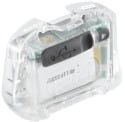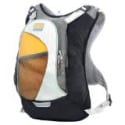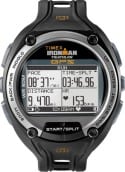We’ve got a ton of the latest trail running gear to share with you over the next few articles. We left the 2010 Outdoor Retailer Winter Market with the intention of providing you with a single post highlighting the best trail running products we saw in Salt Lake City. Well, it turns out that we saw enough great trail running gear to bring you three posts featuring the latest and greatest. This first post will focus on “gear” as opposed to the forthcoming posts on footwear and apparel. Read on for more information on best headlamps, hydration products, trekking poles, GPS watches, and snowshoes we saw at OR.
Petzl Core Battery ($40 for the battery, $85-110 for a full setup with headlamp and charging kit)
 You are likely familiar with Petzl‘s line of Tikka and Zipka headlamps that just very recently received significant improvements in brightness and other attributes with the Tikka2 and Zipka2 lines. Well, Petzl doesn’t rest on its laurels. They’ve announced a rechargeable battery system that they are calling “Core.” The Core easily retrofits onto existing Petzl Tikka2 and Zipka2 headlamps. Not only that, but the entire Tikka2 and Zipka2 lines will continue taking standard batteries, which means that if your Core battery runs out during a longer than expected fastpacking outing, you can scavenge some from other electronics you may have with you.
You are likely familiar with Petzl‘s line of Tikka and Zipka headlamps that just very recently received significant improvements in brightness and other attributes with the Tikka2 and Zipka2 lines. Well, Petzl doesn’t rest on its laurels. They’ve announced a rechargeable battery system that they are calling “Core.” The Core easily retrofits onto existing Petzl Tikka2 and Zipka2 headlamps. Not only that, but the entire Tikka2 and Zipka2 lines will continue taking standard batteries, which means that if your Core battery runs out during a longer than expected fastpacking outing, you can scavenge some from other electronics you may have with you.
Whether you want longer battery life for that fastpack or maximum output for a two hour predawn run, you can program the battery to fine tune the lamp’s brightness to best meet your needs. All you will need to do is download a program to your computer (PC or Mac) and tweak the settings.
The battery is programmed and charged via a simple USB to micro USB cable without the need to remove the battery from the lamp housing. For charging, not only can you plug the USB into your computer, but also USB AC charging bricks such as those for the iPhone or iPods. If you need a AC charging brick or a car USB charger, you’ll be able to purchase the pair along with a spare USB cable and a set off international adapters for $25.
The Core will cost $40 and be available in August. Kits with a Petzl headlamp, Core battery, and USB charging kit will also be available. The Tikka2 Core Kit will retail for $85 and the Tikka XP2 Core kit will run $110.
Princeton Tec Remix Headlamp ($40)
 Princeton Tec launched the Remix, a hybrid LED headlamp, last fall and has already updated its maximum output. The Remix includes three small Ultrabright LEDs and one sunglass-worthy Maxbright LED. While all four LEDs can’t run at the same time, the triplet LEDs and Maxbright LED operate in high and low modes, giving the user four total settings. On the highest setting, the Remix will throw 70 lumens for 28 hours with a reach of 45 meters. The smaller LEDs will put out 30 lumens (28 meter reach) for 61 hours, while offering 200 hours of burn time on the lowest setting. The LEDs are mounted in Princeton Tec’s “asymmetrical single arm bracket”… in other words, you can full rotate the light housing, which is attached on one side only.
Princeton Tec launched the Remix, a hybrid LED headlamp, last fall and has already updated its maximum output. The Remix includes three small Ultrabright LEDs and one sunglass-worthy Maxbright LED. While all four LEDs can’t run at the same time, the triplet LEDs and Maxbright LED operate in high and low modes, giving the user four total settings. On the highest setting, the Remix will throw 70 lumens for 28 hours with a reach of 45 meters. The smaller LEDs will put out 30 lumens (28 meter reach) for 61 hours, while offering 200 hours of burn time on the lowest setting. The LEDs are mounted in Princeton Tec’s “asymmetrical single arm bracket”… in other words, you can full rotate the light housing, which is attached on one side only.
The Remix and the three AAA batteries that power it should weight in at 83 grams. If you want to pick up the Remix, you’ll have to choose between three models, as you can choose a version with white, red, or green Ultrabright LEDs.
Nathan XC Race Series
($70 for the X-Ceed and $80 for the X-Treme)
 The hydration experts at Nathan Sports introduced the XC Race Series at the previous OR show, but we neglected to mention it. The XC Race Series packs all feature the X-Factor Harness, a mesh strap design that crisscrosses the front of your torso. This design allows your arms a full range of motion. The X-Factor Harness can be cinched on the go using the bottom straps or more permanently adjusted with the velcro shoulder straps. The packs also have a front pocket with mesh storage and a tube clip to keep the tube from flapping around. Models include the large 900 cubic inch capacity X-Treme (pictured right) and the racey 24 cubic inch X-Ceed.
The hydration experts at Nathan Sports introduced the XC Race Series at the previous OR show, but we neglected to mention it. The XC Race Series packs all feature the X-Factor Harness, a mesh strap design that crisscrosses the front of your torso. This design allows your arms a full range of motion. The X-Factor Harness can be cinched on the go using the bottom straps or more permanently adjusted with the velcro shoulder straps. The packs also have a front pocket with mesh storage and a tube clip to keep the tube from flapping around. Models include the large 900 cubic inch capacity X-Treme (pictured right) and the racey 24 cubic inch X-Ceed.
It’s worth noting that Nathan has discontinued the HPL #063 and #759.
CamelBak Podium Ice (MSRP $20, but can be found for less)
![]() We’re as surprised as you are that we’re mentioning a water bottle as a highlight of OR. That said, CamelBak‘s Podium Ice bottle is worth noting. First, as part of the Podium series, the 21-ounce bottle includes CamelBak’s Jet Valve, an automatic flow valve akin to Ultimate Direction’s Kicker Valve. What’s new in the Podium Ice is the use of Zero-Loft aerogel insulation that is supposed to keep water cool four times longer than a standard water bottle.* Anecdotally, we’ve observed that the less well insulated Podium Chill keeps water cool for a noticeably longer period of time than a standard bottle. We’ve yet to try running with a Podium bottle as it doesn’t fit well in our stock of handheld carriers, but the CamelBak Quick Grip handheld sleeve solves that problem. The Podium Ice itself adds about a third to the weight of a water bottle at 120 grams vs about 90 grams for a standard bottle.
We’re as surprised as you are that we’re mentioning a water bottle as a highlight of OR. That said, CamelBak‘s Podium Ice bottle is worth noting. First, as part of the Podium series, the 21-ounce bottle includes CamelBak’s Jet Valve, an automatic flow valve akin to Ultimate Direction’s Kicker Valve. What’s new in the Podium Ice is the use of Zero-Loft aerogel insulation that is supposed to keep water cool four times longer than a standard water bottle.* Anecdotally, we’ve observed that the less well insulated Podium Chill keeps water cool for a noticeably longer period of time than a standard bottle. We’ve yet to try running with a Podium bottle as it doesn’t fit well in our stock of handheld carriers, but the CamelBak Quick Grip handheld sleeve solves that problem. The Podium Ice itself adds about a third to the weight of a water bottle at 120 grams vs about 90 grams for a standard bottle.
*[Test was the time it took 32F water to get to 70F when put into a 90F environment. Water in the Podium Ice took 3 hours to reach 70F.]
Two quick notes from the wonderful world of trekking poles.
Leki will be introducing SpeedLock, an external locking mechanism in five models this year, including a women-specific model.
 Then there’s Dynafit. Until OR, we only thought of them as a high-end ski binding company. Well, it turns out they make sick poles, too. We’re not sure when Dynafit introduced its Safety Snap locking mechanism in poles, but it feels very sturdy. More impressive are the external notches that allow for both quick setting of the poles at 2.5 centimeter (~1 inch) increments and provide additional stability. Who says you can’t use ski poles while running. We know we’d love to try a pair!
Then there’s Dynafit. Until OR, we only thought of them as a high-end ski binding company. Well, it turns out they make sick poles, too. We’re not sure when Dynafit introduced its Safety Snap locking mechanism in poles, but it feels very sturdy. More impressive are the external notches that allow for both quick setting of the poles at 2.5 centimeter (~1 inch) increments and provide additional stability. Who says you can’t use ski poles while running. We know we’d love to try a pair!
Timex Ironman Global Trainer Bodylink System (aka Ironman GPS) ($250-$300)
 It’s about time! While we love our Garmin Forerunner 305 (not so much with the 310 XT), Timex’s addition to the GPS running watch market means Garmin finally has some real competition and that can only be a good thing for us trail runners. If you pick up the Timex Ironman Global Trainer Bodylink system (don’t try saying the product name, as it will leave you out of breath), you’ll also get access to the TrainingPeaks online training log for free. Hopefully, this will also press Garmin to improve its Garmin Connect online software. Timex’s GPS training system will be out in September 2010.
It’s about time! While we love our Garmin Forerunner 305 (not so much with the 310 XT), Timex’s addition to the GPS running watch market means Garmin finally has some real competition and that can only be a good thing for us trail runners. If you pick up the Timex Ironman Global Trainer Bodylink system (don’t try saying the product name, as it will leave you out of breath), you’ll also get access to the TrainingPeaks online training log for free. Hopefully, this will also press Garmin to improve its Garmin Connect online software. Timex’s GPS training system will be out in September 2010.
[For our current favorite GPS watches for running, check out our Best GPS running watch guide.]
Easton VO2 Comp Snowshoes ($300)
We’re still getting to know snowshoes, but Easton’s VO2 Comp would have caught our eye before we’d ever floated over 3 feet of Sierra powder. Have no doubts, this is a snowshoe designed for racing. With this racing shoe, there’s no need to rip off the binding, as Easton offers this as a direct mount shoe. You’ll be kept aloft by carbon fiber decking stretched over a high grade aluminum frame. These asymmetrical shoes weigh in at 1.2 pounds apiece. We’re not quite sure how the VOs Comp’s coolest feature – a two piece articulated crampon – will actually perform.
Comments/Questions
So what do you think of these new products? Think you’ll try any when they are released? If you want to know more details about any of the products mentioned above, please ask. We’ll do our best to get you more information.
